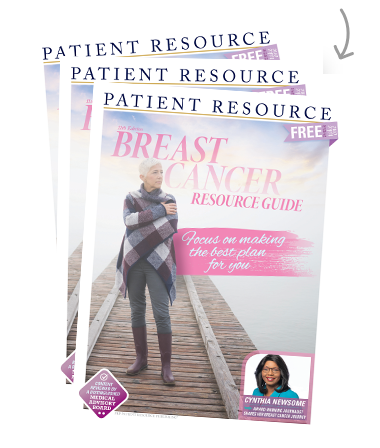Breast Cancer
Cancer During Pregnancy
Cancer during pregnancy is rare, but it can happen. Fortunately, cancer rarely affects the developing baby, so a woman who has cancer can still give birth to a healthy infant. Nevertheless, the medical management of cancer during pregnancy is extremely complex, so it’s important to find specialists with extensive experience in treating pregnant women with cancer. Don’t hesitate to seek a second opinion, particularly when considering treatment options.

Diagnosis
Breast cancer is the most common type of cancer diagnosed during pregnancy. In some cases, routine prenatal tests can help reveal breast cancer that might have otherwise gone undetected until much later. However, pregnancy can sometimes delay a cancer diagnosis because some of the symptoms of pregnancy and cancer overlap, such as breast tenderness, fatigue, breast swelling or inflammation and frequent headaches. These early warning signs of breast cancer are not considered suspicious symptoms when they develop in pregnant women.
Traditional diagnostic tools such as magnetic resonance imaging (MRI), ultrasound and biopsy can still be used to help doctors diagnose cancer in pregnant women.
Treatment
When choosing a treatment plan, the doctor(s) must examine many factors, including the size, location and stage of breast cancer; the stage of pregnancy (gestational age of the baby); any other medical conditions the expectant mother may have; and her wishes.
Surgery is considered the safest treatment option during all stages of pregnancy, as it poses little risk to the developing baby. After the first trimester, the most common treatment plans include surgery and certain chemotherapy drugs. Doctors may choose to delay starting treatment until the second or third trimester because using chemotherapy during the first trimester can result in miscarriage or birth defects. Certain chemotherapy drugs may be used during the second or third trimester; the placenta (temporary organ that connects the mother and baby) creates a barrier around the baby that some types of chemotherapy cannot pass through.
However, some chemotherapy agents may still harm the baby indirectly because of the potential to cause early labor and low birth weight. In addition, treatment side effects that may impact the mother, such as anemia, diarrhea, vomiting or decreased appetite/weight loss, may be detrimental to the pregnancy. Therefore, if a woman is in the second or third trimester, doctors may consider delaying treatment until after the baby is born, particularly with early-stage breast cancer. They also may choose to induce labor early.
Typically, radiation therapy, hormone therapy, targeted therapy and immunotherapy are avoided until after the baby is born because they can potentially cause harm to the developing baby.
Breastfeeding
Breastfeeding when you have cancer is another important issue to consider. Cancer cells cannot be passed to your baby through breast milk. Many chemotherapy drugs have been measured in high levels in breast milk, which can harm the baby, and certain radioactive components may do the same. Therefore, women are generally discouraged from breastfeeding while receiving chemotherapy and/or radiation therapy.
Questions to Ask your Doctor
When you have breast cancer, it is important to maintain an open dialogue with your health care team. When you have breast cancer and are pregnant, ongoing communication with your medical team is crucial. These questions can help you start conversations with your doctor(s):
- What is your level of experience treating pregnant women with breast cancer?
- What type of treatment(s) do you recommend?
- Can I start treatment right away, or should it be delayed? For how long?
- What are the risks of treatment for my baby? For me?
- What are the potential side effects and how might they impact my pregnancy?
- What are the risks of delaying treatment?
- How will treatment affect my delivery?
- Will treatment affect my ability to breast-feed?
- What support services and resources do you recommend?
Additional Resources
- American Cancer Society
- Treating Breast Cancer During Pregnancy
- American Society of Clinical Oncology
- Cancer During Pregnancy
- Hope for Two
- National Cancer Institute
- Breast Cancer Treatment During Pregnancy



